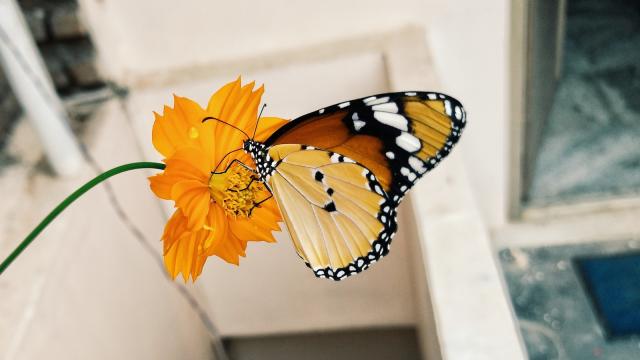Insects are everywhere, and humans are often caught trying to eradicate them. Bugs can make life very inconvenient, even a little gross — but they’re one of the most important parts of our ecosystem. And they’re disappearing. Here’s what can you do to stop their dangerous decline.
The Guardian recently reported on new data published in the journal Biological Conservation that shows insect life in decline all over the world. There are some pretty grim statistics that should be scary even to people who loathe mosquitoes:
More than 40 per cent of insect species are declining and a third are endangered, the analysis found. The rate of extinction is eight times faster than that of mammals, birds and reptiles. The total mass of insects is falling by a precipitous 2.5 per cent a year, according to the best data available, suggesting they could vanish within a century.
Humans essentially depend on insects to live — about half the pollinators in the world are invertebrates, according to the U.S. Department of Agriculture. We need them to keep food crops growing. They’re also a link in a chain; many animals eat insects as their primary good source. You can picture the catastrophic outcome of that link breaking: if there are no bugs, there’s nothing to munch on for all sorts of birds, reptiles, and mammals.
When we get bad news about the environment, it’s often overwhelming; but there is still stuff humans can do to turn the situation around. Here’s how to help.
Grow bug food
The reasons for why the bugs are disappearing at such a rapid rate compared to other life is up for debate; Gwen Pearson, a writer and entomologist at Purdue university, explained in an email to Lifehacker that there isn’t enough information to know for sure:
When I look at data we have on insect eating birds, they also are seeing declines. My personal take is that we don’t have all the data, but waiting until we have enough to say for sure what’s happening to insects might be too late.
The main reasons offered by the study are the heavy use of pesticides, climate change, and “urbanisation”. There’s not much to eat that isn’t coated in poison, and in many areas, what remains is hard to find. But it’s not just city dwellers paving everything in concrete — if you live in a neighbourhood that’s mostly lawns, it’s a different kind of wasteland for bugs. Some can lived there, of course, but pollinators need flowers to survive.
Replace your grass, or at least a significant chunk of it, with flowers and plants appealing to your regional pollinators. No amount of change is too small, according to Pearson:
Everything helps! Any system that is all one plant — whether it is a corn field or your front yard — is not going to support as many insects (and other animals) as one that is more diverse. Even small changes can help our native insect species find food and shelter.
Diversity in what you grown means more diversity in bugs, which makes a healthier eco-system.
Consider your eating habits
When we talk about pesticides, we’re usually talking about growing food, often in a mono-culture, like Pearson warned about. Huge crops of corn, especially, or other feed for livestock. Buying organic or going vegetarian isn’t an option for everyone. If you can makes changes, however, do some reading about where your food is sourced; in a DM to writer Sophie Benoit, scientist Mark Kaspari said even cutting back on meat can make a difference, because the goal is to reduce the amount of land dedicated to big agriculture:
Worried about insect collapse? Me too! (Obviously). Here’s what you can do according to @MikeKaspari pic.twitter.com/pQOBQvTiDb
— Sophia Benoit (@1followernodad) February 11, 2019
How food is produced is a huge key to the survival of our planet — you don’t have to become a hard line vegan to make changes that will shift the landscape.
Contact your representatives
The previous points put the onus on individuals, but there is only so much we can do as consumers. There will always be a huge swath of the population that doesn’t have the privilege of time or money to invest in making sure they’ve gotten the most earth-friendly bunch of kale. The real pressure should be on corporations who benefit from all this pesticide use; this means we need new policies on both local and federal levels.
As Kaspari mentioned above, even city ordinances that encourage planting wildlife for pollinators can make a difference. But you can also support organisations that work specifically on conservation for insects; Pearson suggested the non-profit Xerxes Society.
Don’t give up hope
Finding out we may be on the precipice of disaster is pretty upsetting; personally, I often feel frozen by the scale of what needs to be done in the face of climate change and environmental destruction. Pearson, who knows far, far more about the lives and loss of insects, says her feelings about how much hope to have go back and forth:
I’ve seen so many negative changes by introduced species and habitat loss in our forests and public lands, and it’s hard to not be pessimistic. But I also know that only if I get up every day and work to make things better; and inspire and be inspired by my students, can I make things better.
She’d also like to point out that the language we use in regards to the insect crisis is a bit misleading:
Claiming that all insects will go extinct is not a reasonable claim—there are so many! Some will do better. Some will do worse. Some are spreading worldwide (Example: fire ants) and some are already gone (Example: the butterfly the Xerces Society is named for).
So, instead of thinking that the insects are all dying, think about how you’d rather be surrounded by butterflies than fire ants. Plant seeds for the world you want to live in.

Comments